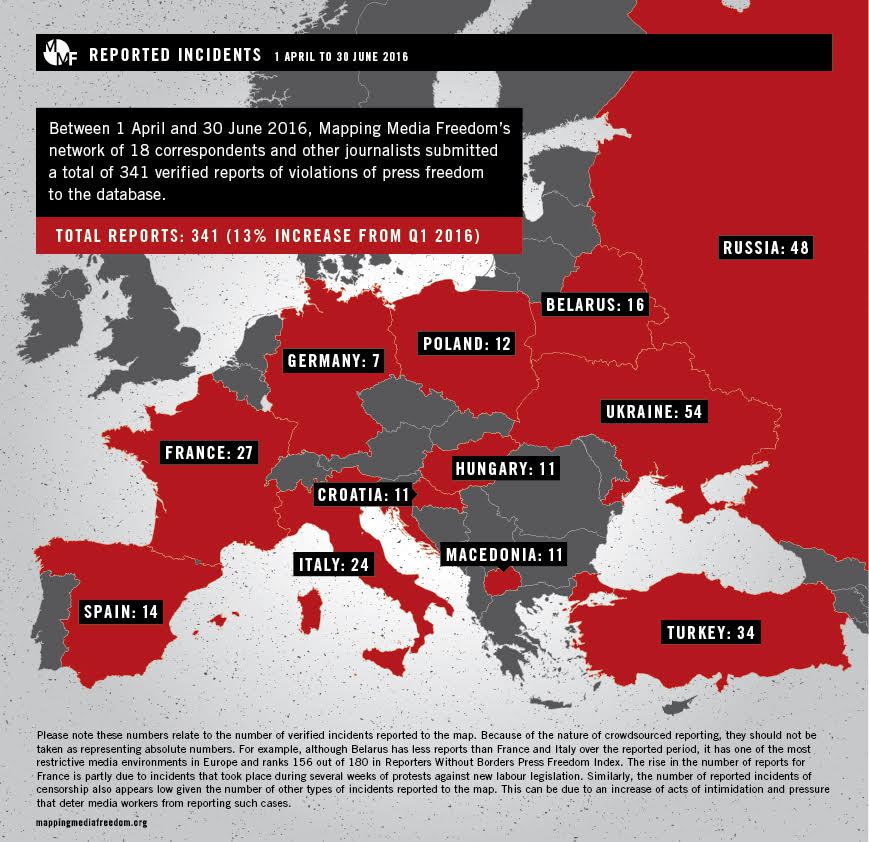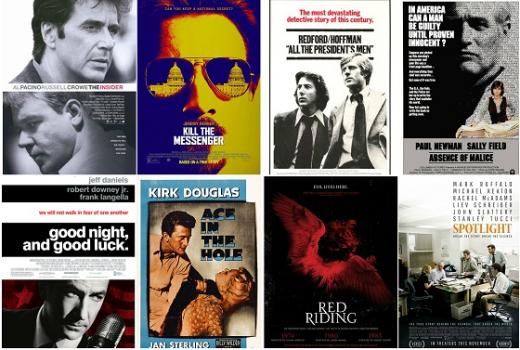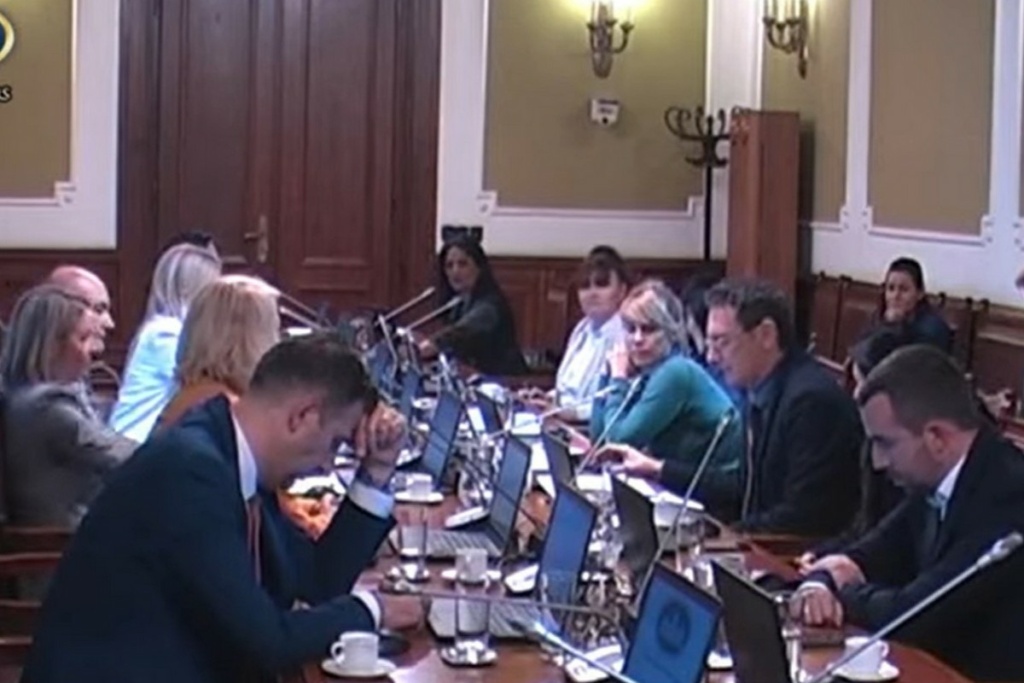Violence against journalists in Europe increased in the second quarter of 2016, reports submitted to Index on Censorship’s Mapping Media Freedom platform show, as a government crackdown in Turkey intensified and protests turned violent in countries from France to Finland
Between 1 April and 30 June 2016, Mapping Media Freedom’s network of 18 correspondents and other journalists submitted a total of 341 verified reports of violations of press freedom to the database, a 13% rise over the first quarter of 2016. The platform was established in May 2014 to document threats to media freedom across Europe and neighbouring countries.
During the second quarter of 2016: two journalists were killed; 60 incidents of physical assault were confirmed; media professionals were detained in 41 incidents; 45 criminal charges and civil lawsuits were filed; 80 verified reports of intimidation, which includes psychological abuse, sexual harassment, trolling/cyberbullying and defamation were recorded; journalistic work was censored or altered 15 times; and media professionals were blocked from covering a story in 73 incidents.
“Europe is considered one of the safest places for journalists in the world. However, increasing concerns about national security in the region – coupled with creeping authoritarianism – is making it an increasingly difficult place for the media to operate freely and safely,” said Hannah Machlin, project officer for Mapping Media Freedom. “And the threats are not just coming from the usual suspects: 12 incidents of injuries to journalists occurred in France and in a number of these cases journalists appear to have been targeted by police.”

Journalists target
In Turkey, in the city of Gaziantep, journalist Mohammed Zahir al-Shergat died as a result of gunshot wounds. Members of IS have since claimed responsibility for the attack. Journalist and radio host Luka Popov from northern Serbia was found dead in his home in Srpski Krstur. Police quickly arrested three individuals who are said to have confessed that Popov was killed during a burglary.
Three journalists survived gun attacks. In a second attempt on his life, Syrian independent journalist Ahmed Abd al-Qader was shot at in Urfa, Turkey, by two gunmen who claimed to be working for IS. In Russia, Oleg Kunitsyn, deputy editor-in-chief of the local newspaper Minuta Istiny, who has been reporting on corruption connected to Vologda’s mayor, was shot twice by an unknown assailant. Turkish journalist Can Dündar was shot at, but unhurt, outside a courthouse in Istanbul just before the verdict was to be announced in his trial on charges of revealing state secrets.
Physical assaults and injuries increased by 46% in the second quarter of 2016 to a total of 60. More than half of the violence took place in Ukraine, Russia and France. Journalists reporting on corruption were frequently targeted. In Ukraine, 13 incidents occurred. In one of those incidents unidentified masked assailants kicked and punched Zaporizhzhia Anatoliy Ostapenko, co-founder of Hromadske TV, who was investigating local corruption. In Russia, 11 reports of violence against media workers were verified. Eduard Mochalov, editor-in-chief of local newspaper Vzyatka, and independent journalist Aleksandr Nikishin, were both assaulted in separate attacks; Denis Kuchmenko, general director of the local television company Gorod, who had authored a number of reports on corruption in elections, sustained serious injuries from two masked assailants using a taser.
 “Journalists are beaten, intimidated, imprisoned and killed in the pursuit of telling a story, exposing the truth and informing the public. These courageous men and women are the vanguard for free speech, freedom of expression and, ultimately, a free and democratic society. We need to come together and fight for journalists’ safety and end impunity for crimes committed against journalists,” said Dunja Mijatović, the OSCE Representative on Freedom of the Media.
“Journalists are beaten, intimidated, imprisoned and killed in the pursuit of telling a story, exposing the truth and informing the public. These courageous men and women are the vanguard for free speech, freedom of expression and, ultimately, a free and democratic society. We need to come together and fight for journalists’ safety and end impunity for crimes committed against journalists,” said Dunja Mijatović, the OSCE Representative on Freedom of the Media.
The second quarter saw journalists targeted while covering demonstrations. In France, journalists reporting from protests opposing proposed changes to French labour law were injured in 12 incidents. Media workers said they were targeted by police using batons, “flash-balls” (a non-lethal weapon that most commonly fires rubber balls, tear gas and stun grenade launchers. Journalists have also been injured while covering rallies in Spain,Greece, Macedonia, Finland and Bosnia.
“Journalists have been caught between some violent protesters and strong-arm police practices despite often wearing helmets and other articles that clearly identify them as members of the press. These incidents point to an acute need for training for front-line members of law enforcement across Europe,” said Melody Patry, senior advocacy officer for Index on Censorship. “This would include respecting the right of media professionals to perform their public-interest role of monitoring and reporting the news during protests, including on police conduct.”
Detained and prosecuted
 Journalists were arrested and detained at least 41 times for doing their job, a 52% increase over the first quarter of 2016. Most of the arrests occurred in Turkey where the platform verified 18 incidents. The arrests were made under terror or insult charges. Press freedom advocates were targeted when Erol Önderoğlu, representative of non-governmental organisation Reporters Without Borders (RSF), human rights defender Şebnem Korur Fincancı and journalist Ahmet Nesin were placed in pre-trial detention on 20 June for participating in a solidarity campaign with the Kurdish daily newspaper Özgür Gündem. Another 18 incidents occurred in Russia, Ukraine and Belarus. In eastern Ukraine, pro-Russian separatists in the self-proclaimed Luhansk People’s Republic detained Ukrainian journalist Olga Bogdanova, a correspondent for Holos-Info.
Journalists were arrested and detained at least 41 times for doing their job, a 52% increase over the first quarter of 2016. Most of the arrests occurred in Turkey where the platform verified 18 incidents. The arrests were made under terror or insult charges. Press freedom advocates were targeted when Erol Önderoğlu, representative of non-governmental organisation Reporters Without Borders (RSF), human rights defender Şebnem Korur Fincancı and journalist Ahmet Nesin were placed in pre-trial detention on 20 June for participating in a solidarity campaign with the Kurdish daily newspaper Özgür Gündem. Another 18 incidents occurred in Russia, Ukraine and Belarus. In eastern Ukraine, pro-Russian separatists in the self-proclaimed Luhansk People’s Republic detained Ukrainian journalist Olga Bogdanova, a correspondent for Holos-Info.
A total of 45 criminal charges and civil lawsuits were reported to the platform, an increase over the first quarter of 2016. In Luxembourg, French journalist Edouard Perrin was sued by accounting and consulting firm PWC for his involvement in publishing leaked documents that revealed tax evasion by large multinational corporations. Perrin was acquitted on 29 June 2016. In Turkey, harsh sentences were repeatedly given to journalists just for doing their jobs: Arzu Yildiz was sentenced to 20 months in jail and deprived of legal guardianship of her children; prominent editor-in-chief of Cumhuriyet newspaper Can Dündar was sentenced to five years and ten months in prison while his colleague Erdem Gül was sentenced to five years; Kurdish journalist Murat Verim was sentenced to six years in prison.
In most cases, prosecution and indictment of journalists are the result of authorities exploiting broad anti-terrorism, national security and defamation legislation in order to criminalise dissent or critical reporting.
“The fight for the abolition of prison sentences for offences committed through the press is unfortunately still relevant in Europe and neighboring countries,” Christophe Deloire, RSF secretary general, said. “In a climate of growing fear and suspicion, judicial persecution of journalists takes more and more diversified forms. The Turkish authorities continue to invoke the anti-terrorism law, the protection of state secrets or insults to the head of state to prosecute and imprison more journalists.”
 The platform has also documented cases involving intimidation of journalists who have been targeted for their reporting. Numerous death threats against journalists were verified across the region in Bosnia, Russia, Italy, Serbia and Turkey.
The platform has also documented cases involving intimidation of journalists who have been targeted for their reporting. Numerous death threats against journalists were verified across the region in Bosnia, Russia, Italy, Serbia and Turkey.
“Death threats are clear-cut, reprehensible and unacceptable. But reports submitted to Mapping Media Freedom show that intimidation can come in many – sometimes subtle – forms,” said Index’s Machlin. “For example, in Azerbaijan, Index believes that authorities are seeking to silence Ganimat Zahid, the exiled editor-in-chief of Azadliq newspaper, by sentencing two of his relatives to six years in jail on drug possession charges, a tactic that has been used in the past. But even legitimate investigations can have a censoring effect on the journalists involved. Police and prosecutors have a duty to respect the rule of law and be transparent about their motives.”
Media outlets were probed in Greece when Athens police, accompanied by a prosecutor, conducted a midnight raid at Skai TV; in Russia, when police visited the offices of Echo of Moscow radio station to question the website editor about the publication of an article by opposition figure and anti-corruption campaigner Alexei Navalny; and in Finland, when tax authorities threatened to raid Finnish broadcasting company Yle employees’ workplaces and homes to access all documentation concerning the Panama Papers.
New laws threaten a free press
 A broad range of laws introduced during the second quarter infringe on press freedom. In Germany, proposed legislation would allow the foreign intelligence service to increase its power to surveil foreign journalists. Belgium’s justice minister Koen Geens announced his intention to double the length of prison sentences for divulging confidential information. In Poland, a new anti-terrorism law was passed which gives the head of the intelligence agency the right to shut down online media outlets, including websites and television programmes. In Italy, a senate commission voted unanimously to increase penal sanctions, including a maximum sentence of six to nine years in prison, against persons accused of libel targeting politicians, magistrates or public servants. The proposals were dropped from the bill on 9 June 2016.
A broad range of laws introduced during the second quarter infringe on press freedom. In Germany, proposed legislation would allow the foreign intelligence service to increase its power to surveil foreign journalists. Belgium’s justice minister Koen Geens announced his intention to double the length of prison sentences for divulging confidential information. In Poland, a new anti-terrorism law was passed which gives the head of the intelligence agency the right to shut down online media outlets, including websites and television programmes. In Italy, a senate commission voted unanimously to increase penal sanctions, including a maximum sentence of six to nine years in prison, against persons accused of libel targeting politicians, magistrates or public servants. The proposals were dropped from the bill on 9 June 2016.
Job losses
Journalists continue to face increasing financial insecurity. There were 33 incidents of employment loss reported to the map.
“In 26 cases we verified, it appears that media workers lost their jobs for refusing to censor material or in connection with their political beliefs. In just one case in Serbia, the entire editorial staff of RTV Vojvodina, a radio and television station, said they were being replaced with journalists selected by the ruling Serbian Progressive Party,” Machlin said.
In Russia, a shake-up at RBC media resulted in the dismissal of the outlets’ top editors: Elizaveta Osetinskaya, RBC editor-in-chief; Maksim Solyus, editor-in-chief of the RBC business newspaper; and Roman Badanin, RBC deputy chief editor. Reuters reported that RBC managers bowed to political pressure from the Kremlin. Five journalists working for public broadcasters have lost their jobs in Poland, including long-time TV journalist, Dorota Ceran, who was reportedly dismissed for editorials critical of the state.
Media outlets also closed during the second quarter: Krymska Svitlytsya, the only Ukrainian-language media outlet in Crimea, was forced to shut down. The owners of Hungary’s Metropol newspaper announced that the outlet would fold due to financial pressures. A number of Hungarian print publications are also set to close down or continue online only, following state funding for cultural magazines being heavily cut.
French 24-hour news channel iTélé laid off a total of 70 people as part-time contracts were terminated. In the United Kingdom, redundancies from restructuring were announced at Trinity Mirror, Archant Limited, The Telegraph and Vice News.
Censorship and blocked access
 Journalists’ work was censored or altered 15 times from 1 April to 30 June. Sofia-based Nova TV removed 90 political cartoons and an interview with Bulgarian cartoonist Chavdar Nikolov from its website. In Russia, Aleksandr Egorychev, the deputy governor of Kaliningrad oblast, pressured the newspaper Tridevyatyi Region to censor articles about ruling party United Russia’s primary elections. The editor-in-chief refused to comply but the editorial team subsequently decided not to publish the articles to allegedly avoid threats. Security and police forced journalists to delete photographs at protests inMacedonia and France.
Journalists’ work was censored or altered 15 times from 1 April to 30 June. Sofia-based Nova TV removed 90 political cartoons and an interview with Bulgarian cartoonist Chavdar Nikolov from its website. In Russia, Aleksandr Egorychev, the deputy governor of Kaliningrad oblast, pressured the newspaper Tridevyatyi Region to censor articles about ruling party United Russia’s primary elections. The editor-in-chief refused to comply but the editorial team subsequently decided not to publish the articles to allegedly avoid threats. Security and police forced journalists to delete photographs at protests inMacedonia and France.
Media professionals and outlets were blocked from reporting in 73 verified incidents. In Ukraine, where there were 16 cases, a broad range of perpetrators – government officials, security personnel, police and businessmen – hindered journalists from reporting. In Belarus, out of nine cases where journalists were blocked from reporting, eight targeted independent and freelance journalists. Three foreign correspondents – American David Lepeska, Greek Giorgos Moutafis and German Volker Schwenck – were denied entry into Turkey. In Russia, British journalist Arthur House, the deputy editor of the Calvert Journal, was expelled from the country following a court decision. Journalists were barred from press conferences with political figures in the United Kingdom, Estonia and Poland. Media outlets were blocked in the eastern region of Turkey, in Crimea, Russia, Ukraine and Latvia.
“We are witnessing a resurgence of censorship in all its forms,” Ricardo Gutierrez, EFJ secretary general, said. “Governments, even in the ‘old Europe’, do not hesitate to block websites, ban publications or bar access to journalists. Citizens must realise that it is their right to be informed that is so fundamentally challenged. They must not forget this when they elect their political representatives.”
Each report is fact checked with local sources before becoming available on the interactive map. Please note the number of reports per country relate to the number of verified incidents reported to the map. They should not be taken as representing absolute numbers. For example, the number of reported incidents of censorship appears low given the number of other types of incidents reported on the map. This could be due to an increase in acts of intimidation and pressure that deter media workers from reporting such cases. The platform — a joint undertaking with the European Federation of Journalists and Reporters Without Borders, partially funded by the European Commission — covers 42 countries, including all EU member states, plus Albania, Azerbaijan (added to the map in February 2016), Belarus (added in September 2015), Bosnia, Iceland, Kosovo, Macedonia, Montenegro, Norway, Russia (added in 2015), Serbia, Turkey and Ukraine (added in 2015). The platform marked its two-year anniversary in May 2016 and has recorded over 2,000 incidents threatening media freedom since its launch.

 France: Violence against journalists at protests
France: Violence against journalists at protests
Journalists covering protests against France’s labour reform bill have faced intimidation, detention and injury.
5 April – Journalist Christophe Gueugneau, who works for independent website Mediapart, reported on Twitter that a police officer from the BAC (an elite police special unit of French Interior Ministry) tried to break his phone during a protest in Paris.
9 April – A group of seven to eight journalists was assaulted by around 30 protesters in Nantes. A journalist was punched in the face and his tooth was broken, the journalists told BFMTV. Later, journalists, photographers and camerapeople were followed by protesters, who threw stones in their direction.
28 April – Michael Bunel, a photographer for Ciric agency who was covering a protest against the proposed labour law, was hit in the foot by a tear gas canister in Place de la Nation in Paris.
1 May – Journalist Cyrille Eldin of Canal Plus, was threatened by participants of a May Day rally organised by National Front and his cameraman’s foot was hit by a protester in Paris.
1 May – Photographer Fab Enero was hit in the face by an exploding stun grenade thrown by police officers during a protest in Paris.
10 May – Journalist Cyril Castelliti, who works for weekly magazine Les Inrockuptibles, was injured by a tear gas cannister or stun grenade launched by riot police during a protest held in Paris against the proposed labour law, the magazine reported on their website.
12 May – Journalist Arthur Berdah, who covers politics for the daily newspaper Le Figaro, reported on his Twitter page he had been hurt by a cobblestone which had been aimed at police officers during a protest against the proposed labour law in Paris.
16 May – In Paris, a cameraperson working for Agence France Presse (AFP) had his camera broken “by a member of the police forces, while the journalist was filming an arrest”.
17 May – A reporter for Russian channel RT was hit on the head while covering protests against the proposed labour law in Paris, RT reported. As shown by a video published on RT’s website, reporter Anna Baranova was speaking in front of the camera when she was hit on the helmet by an unknown assailant who was wearing a hoodie and a scarf which covered his face.
19 May – Documentarist Thierry Vincent was filming a riot police officer pointing a flash-ball, a non-lethal hand-held weapon, at a crowd in Paris, when he was hit by an officer.
2 June – Police forces pushed, shoved and hit journalists with batons while dispersing a protest against the proposed labour law in Rennes.
14 June – Photographer Michael Bunel, who works for CIRIC agency, sustained injuries from a flash-ball shot, a non-lethal hand-held weapon
 Turkey: Investigation opened against journalists for solidarity campaign
Turkey: Investigation opened against journalists for solidarity campaign
On 18 May, Turkish judicial authorities launched investigations for “terrorist propaganda” against journalists who participated in a campaign initiated by Kurdish daily newspaper Özgür Gündem. Beginning on 3 May – World Press Freedom Day – prominent Turkish editors, writers and activists became co-editors-in-chief for a day to express solidarity with the Kurdish paper, which has been under pressure by Turkey’s government. A group of journalists and trade unionists was summoned to answer questions about articles deemed to be “terrorist propaganda” and an “incitement to crime”. On 25 May, Erol Önderoglu, a representative for Reporters Without Borders, Şebnem Korur Fincancı, a human rights defender and author Ahmet Nesin were questioned. On 20 June, following a prosecution office decision, Fincancı, Önderoğlu and Nesin, who were part of the group investigated, were arrested and detained. On 30 June, Onderoglu and Korur Fincancı were released conditionally. Nesin was released on 1 July.
 Ukraine: Website leaks personal information of more than 5,400 journalists
Ukraine: Website leaks personal information of more than 5,400 journalists
Between 10 and 20 of May, Ukrainian website Myrotvorets, which is translated as Peacemaker, leaked personal data of more than 5,400 journalists who have been accredited in the self-proclaimed Donetsk People’s Republic (DPR) – the part of Donbas area beyond Ukraine’s government control. The site published the names of the journalists, the media outlets they work for, country of origin, mobile phone numbers, email and dates of stay in the DPR. According to the Myrotvorets site, 2,082 of them are Russian journalists, 1,816 are journalists from other countries and the remaining are from local media. The list included media professionals working for BBC, Reuters, AFP, The Independent, Ceska Televize, CNN, Bloomberg, Al Jazeera, Associated Press, Liberation, ITAR-TASS and other media. Following the leak, two journalists on the list – Kateryna Sergatskova and Roman Stepanovych – reported receiving anonymous threats.
 Russia: Pro-government TV channels denigrate independent and foreign media
Russia: Pro-government TV channels denigrate independent and foreign media
During the second quarter, Russian state channels produced documentaries which the Russian Press Council said sought to discredit independent and foreign media outlets. State channel NTV produced a documentary entitled Debtors of the US State Department, which aired on 4 March. The film accuses regional independent media outlets of changing their editorial policies to comply with directives from the US government-backed media development investment fund. The Press Council, an independent civil society organisation, concluded that the programme was aimed at discrediting the management of the channels and contained false information to manipulate viewers. The council stated the documentary is “a false accusation which dishonours its authors and casts a shadow over the whole Russian media industry”. NTV, which is owned by state gas company, Gazprom-Media, reportedly refused to discuss the documentary with the Press Council.
In June, the council published a similar conclusion about local Siberian OTS-TV channel, which in February aired two reports about BBC journalists, accusing them of defaming Russia. OTS broadcast journalist Alexandr Kurshev produced the stories by following BBC journalists and menacing them by interrupting their work, the Russian Press Council reported.
The Press Council said that the reports were products of political propaganda that sought to discredit the BBC film crew. The council added that the responsibility for the reports lay not just with the reporter but with the entire OTS-TV editorial department.
This report is also available in PDF format.
Foto: mappingmediafreedom.org


 Filmovi o novinarima i za novinare
Filmovi o novinarima i za novinare Silovanje ili cenzura: Na šta to smrdi Pepe le Tvor?
Silovanje ili cenzura: Na šta to smrdi Pepe le Tvor? Medijski amandmani umiru u skupštinskom mraku: Noćno zasedanje Odbora, u četiri čina
Medijski amandmani umiru u skupštinskom mraku: Noćno zasedanje Odbora, u četiri čina
Ostavljanje komentara je privremeno obustavljeno iz tehničkih razloga. Hvala na razumevanju.